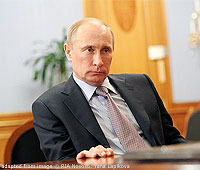A non-review of Anna Arutunyan’s ‘The Putin Mystique’

(Moscow News – themoscownews.com – Natalia Antonova – January 30, 2014) Anna Arutunyan’s “The Putin Mystique” came out in Britain this week, and this article is not an attempt to review the book. Although we frequently highlight the accomplishments of our friends and colleagues as part of the buys of the week rubric, an actual review of Anna’s book would be taking things too far.
After all, Anna has been at The Moscow News longer than any of us have – certainly longer than I have. And in the years I have spent working side-by-side with her, braving everything from tooth-grindingly slow news days to violence at unsanctioned protests, it’s hard for me to say anything about “The Putin Mystique” besides a very obvious, “My friend and colleague wrote a book. It’s awesome. Buy it.”
Still, I did want to write about one aspect of the book that probably won’t get much play in proper reviews: the ordinariness, the sheer blandness at the heart of various socio-political phenomena that she describes.
Mystification of Russian politics and society is a process that everyone participates in, including Russians themselves. Every time people tweet funny pictures from a Russian dating site accompanied by the immortal phrase “Meanwhile, in Russia,” they participate in the myth-making process.
“The Putin Mystique” shows us that Russia is, in fact, an ordinary country. It’s just that Russia’s internal processes are shaped by a long, complicated and bloody history that is frequently either ignored outright or cherry-picked to fit a particular picture.
The president, meanwhile, is not nearly as mysterious if you figure out how he got where he is today – and how, as Anna deftly argues, the demands that society places on him come to influence his decisions. >From oligarchs to factory workers in single-industry towns, the Russian people shape the Putin narrative whether they want to or not.
It’s not a narrative that comes with an opt-out option. The gears of history are turning before our eyes, sometimes managing to grind us down in the process. By tracing both corruption scandals and famous trials, street protests and backstage intrigue, Anna shows us how in Russia, there is very little mediation between the individual and the state. The Putin described in the book is not some abstract man that the millions of people living here, foreign journalists included, get to see on TV every once and again; for better or for worse, his decisions directly affect lives.
As a writer who hates to take sides, and indeed finds the whole side-taking process tiresome, Anna ultimately paints a picture of modern-day Russia that is at once depressing and reassuring. Whether discussing lack of social mobility that inspires young people to join pro-Kremlin movements or ruminating on the complicated dance performed in tandem by the state and the Russian Orthodox Church, she repeatedly tells us that there are no surprises here.
Anna is also one of those writers who use the word “primordial” a lot. Sometimes, I think, she overlooks the terrible beauty of Russia, the dark poetry that is on the wind in this country, the passion that burns like a low fire in the hearts of the people you meet. Then again, she is not a romantic. In our own professional tandem, that role is largely left to me. And despite my own habit of sentimentalizing the countries I fall in love with, I found “The Putin Mystique” a persuasive book (even painfully so, at times).
I can’t recommend it to anyone who wants easy answers about the Russian state’s past, present and future. But if you’re one of those people who hear Shakespeare’s famous “Nothing will come of nothing, speak again,” and gets a little shiver down their spine, then you will enjoy “The Putin Mystique.”
